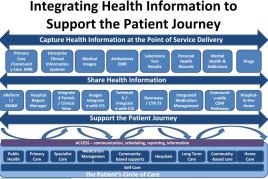In just six years, from 2006 to 2012, the use of electronic health records (EHRs) in Canada has jumped from 23% to 56% and saved the Canadian medical system $1.3 CAN billion, a study commissioned by Canada Health Infoway has revealed.
Great for clinicians in the Canadian medical system, but how do EHRs impact community support services within Canada and the US?
EHRs in residential care
A US National Centre for Health Statistics 2013 report on Use of Electronic Health Records in Residential Care Communities found 17% of residential care communities were using EHRs as of 2010. A quarter of those have the capacity through the use of health information technology to share EHR information externally with pharmacies.
EHRs beyond residential care
The use of EHRs in community services such as senior care, mental health, and behavioral health is unsurprisingly on the rise too as holistic care plans gain greater traction and treatment and support services are co-managed in integrated care solutions. Read The Benefits of the Electronic Health Record for Older Adults across the Continuum of Care.
Integrated care practices enable information sharing
Maide Yazar, chief strategist at Healthtech, demonstrated how health information could freely flow between health practitioners and community service providers in his presentation Integration to Support Integrated Care Practices at the 2012 National Symposium on Integrated Care, hosted by the now defunded Health Council of Canada.

Click on image to enlarge and view the entire presentation. Or go here.
How do electronic records reduce costs?
The use of electronic records, whether EHRs, EMRs (electronic medical records), or simply electronic forms are shown to reduce overall costs and deliver long-term savings through:
- reduced errors
- reduced duplication of information and processes
- reduced administrative costs because staff spend less time on paper-based administrative tasks
- reduced costs through more effective care management
- increased provider efficiency and productivity as staff time is redeployed
A network of interoperable EHR solutions in Canada
Canada Health Infoway is leading the charge in bringing all Canadian healthcare practitioners onboard with EHRs, succinctly and elegantly citing the main benefits as: "A network of interoperable EHR solutions in Canada – one that links clinics, hospitals, pharmacies and other points of care – will help improve Canadians' access to health services, enhance the quality of care and patient safety…". Read more.
Interoperable Pan Canadian EHR adoption is estimated to cost care providers nearly $10 billion CAN all told. But Canada Health Infoway believes it’ll be worth it, predicting an 8:1 return on that investment and a net savings of almost $40 CAN billion over a 20 year period.
Sharing EHR information across the information highway
Independent service providers don’t have to adopt EHRs to be able to benefit from them, just be able to access them online and integrate their information, a quick and simple task with Web-based information management software. Catrin Brodie, in her article The Benefits of the Electronic Health Record for Older Adults across the Continuum of Care, explains that 24/7 online access to electronic health records “ allows for the best care for patients because now their doctors, nurses, hospitals and community services can share information across the information highway.”
Find out more
Canada Health Infoway: The emerging benefits of electronic medical record use in community-based care
Canada Health Infoway: A framework and Toolkit for Managing eHealth Change
Was this post helpful? Don't forget to submit a comment before you leave! We'd love to know your thoughts and experiences. Till next time...

